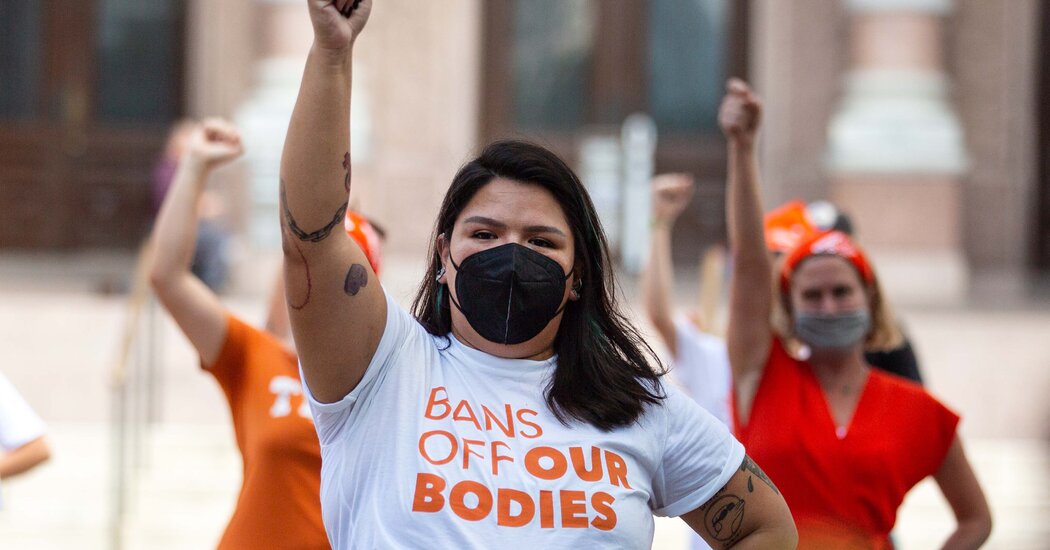Companies Stay Quiet on Texas’ New Abortion Law
Businesses that expressed opposition to restrictive voting laws are declining to take a similar stand on the abortion measure.When Texas lawmakers advanced a restrictive voting rights bill this year, American Airlines and Dell Technologies, two of the state’s biggest employers, were early and vocal critics of the effort.But this week, as a law that prohibits most abortions after about six weeks took effect in Texas, both companies declined to comment on the measure.American Airlines and Dell were representative of the business community at large. While many corporations are taking stands on voting rights, climate change, immigration and other important matters, few companies would comment on the abortion law.Abortion is one of the country’s most politically and emotionally charged issues, and as much as 40 percent of the American public supports outlawing or severely restricting it, according to the Pew Research Center. Opposition to abortion often cuts across demographic groups, and most executives would be reluctant to take a public stand that was likely to anger or alienate a large group of customers and employees whatever they said.“No one is going to walk willingly through this door,” said Sandra Sucher, a professor of management at Harvard Business School. “If I’m a business making a political calculus, it’s just a matter of who I’m going to piss off.”Two dozen major companies contacted by The New York Times on Friday either did not reply or declined to comment. Among those that would not say something were McDonald’s, a sponsor of International Women’s Day; PwC, a major supporter of diversity and inclusion efforts; and Coca-Cola and Delta Air Lines, which led a corporate backlash last year against a restrictive voting bill in Georgia, where they have their headquarters.Many of the biggest employers in Texas, including AT&T, Oracle, McKesson and Phillips 66, declined to comment. Even companies that are quick to speak up on social issues, including Patagonia and Levi’s, did not say anything about the new law. And Catalyst, a nonprofit organization that teams up with big companies to “build workplaces that work for women,” declined to comment.“When all of these companies who participate in things like International Women’s Day won’t speak out on reproductive health care, it shows that they care about the bottom line, not what women need and want,” said Lindsey Taylor Wood, chief executive of The Helm, a venture capital firm that funds female founders. But Elizabeth Graham, a vice president of Texas Right to Life, a group that backs the law, said it would be good for business in the state, claiming that a majority of people there are “conservative and pro-life.”“Many of our supporters are small and medium-sized business owners,” she said. “They are very much in favor of it.”Joe Pojman, executive director for Texas Alliance for Life, another group that supports the new law, said he had seen scant evidence of any pushback from the businesses.“We just haven’t seen any evidence of that, and we frankly are grateful for that,” he said.Before the law, known as Senate Bill 8, went into effect on Wednesday, some legal experts had argued it would face legal challenges that would postpone its enforcement or ultimately strike it down. The law empowers private citizens to sue anyone who performs an abortion or “aids and abets” such a procedure, a broad definition that could include a driver for a ride-hailing company who takes a woman to a health clinic.But the Supreme Court declined on Wednesday night to block the law, which rules out abortion as an option before most women even know they are pregnant in the second-most-populous state, while the legal challenge to it continues in court.“Companies were caught off guard,” said Jen Stark, an executive at the Tara Health Foundation, which has organized companies in support of reproductive issues. “Usually the courts have stepped in.”Over the past few days, companies have been scrambling to decide what, if anything, they would say about the new law.Abortion is an issue that is closely associated with religious views, an area where businesses are exceedingly cautious.“Keeping religion out of business has been one of the ways that companies try to create a safe space for everyone,” Professor Sucher said. “This marches squarely into the realm of religious views.”The governor of Texas, Greg Abbott, who championed the law, has said it would not hurt the state economically, including its longstanding efforts to get businesses to move there from higher-cost and more liberal parts of the country like California and New York. He argued that some employers would be drawn to the state because of its conservative laws, citing Elon Musk, who runs Tesla and SpaceX, as one such executive.“This is not slowing down businesses coming to the state of Texas at all,” Mr. Abbott, a Republican, told CNBC on Thursday. “In fact, it is accelerating the process of businesses coming to Texas.”But while most executives have stayed quiet, a few have spoken out.Whitney Wolfe Herd, the founder of Bumble in Austin, said it was donating funds to organizations that supported Texas women seeking abortions.Richard Drew/Associated PressBumble, the dating app company founded by Whitney Wolfe Herd and based in Austin, said it was donating funds to organizations that supported women in Texas seeking abortions.“Bumble is woman-founded and women-led, and from day one we’ve stood up for the most vulnerable,” the company said in an Instagram post. “We’ll keep fighting against regressive laws like #SB8.”Understand the Texas Abortion LawCard 1 of 4The most restrictive in the country.
Read more →
